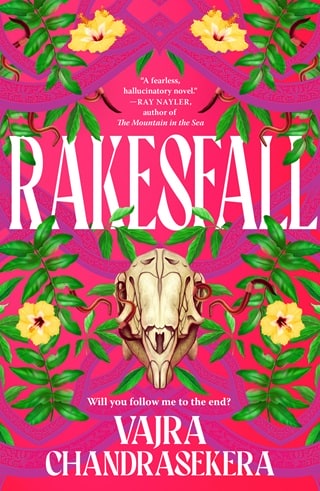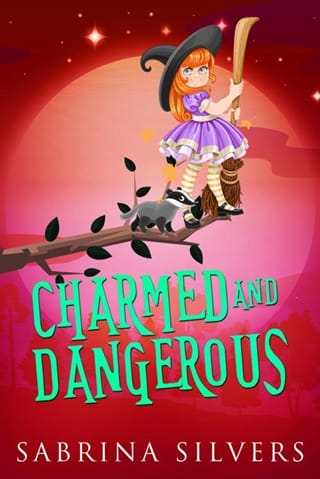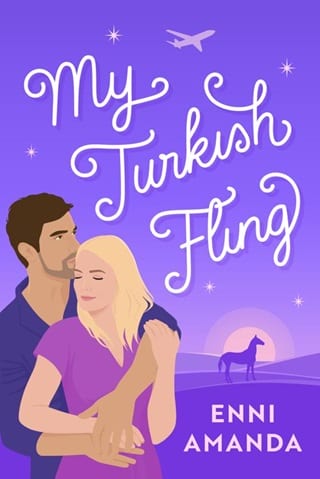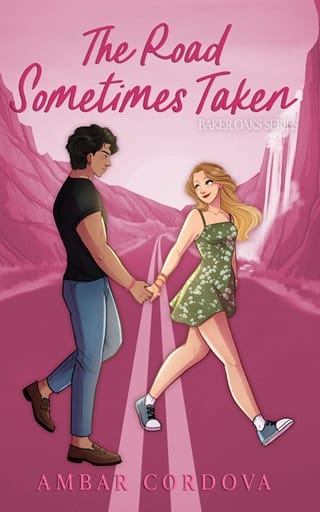Chapter 25 The Ghost Behind the Green
Little hunting darts pierce me through and through—I am slain, again. I never see it coming.
I fear that She will keep firing, that the swarm of arrows like locusts will eat me up until there is nothing but a stain to mark where I fell back to the soil of grandmotherboard earth, but She stops once I fall, and the swarm returns to Her, clickety click, to reload and rest.
It hurts to be. I lie where I fell, writhing slowly. The light seems unnaturally bright, as if my pupils have been forced open by shock.
She approaches cautiously, weapon steady. Her pelt is greying, Her eyes large and soft, Her mouth tight. She satisfies Herself that I am not an immediate threat: physically, She confirms that my tendons are ripped and bones broken; psychically, She scans my ports and sockets, tests the strength of my apotropaics, builds virtualizations around me to isolate me from grandmotherboard earth.
"Well," She says finally. Her voice is a rasp. She squats next to my head, tapping me in the temple with the bow's long muzzle. I expect to feel metal warmed from firing, but it is a different warmth, like wood in the sun.
—Another haunted jungle, I say. Fluids pour from my wounds and my mouth, making speech difficult in the haunted world; I speak instead at the lowest level of representation.
I'm not sure She is listening, if She's even present in that realm. She doesn't seem to have heard me; perhaps She's abandoned representation altogether in Her loneliness.
She blinks slowly. Her eyes are sunken and Her brows heavy, hair all over Her body, Her philtrum high and broad; O, Her phenotype looks like a bonobo to me, sacred and profane. My incarnate body is late holocene human, hairless, disease-riddled, the only sufficiently detailed public domain reference that my god could find; I am clothed as I was printed, a fragile body in an environment suit and heavy boots, all now with many holes. I'm too young. This is too hard. It's difficult to keep my eyes open. The noises coming out of me are involuntary gasps of pain. The movements of my body, also involuntary, are slowing. Weakening.
"Do I know you?" She taps me in the head again. I manage to meet Her eyes in the real, in the haunted world.
—Can you hear me? I scroll through several higher levels of representation, where self and world are purely symbolic and communication is the exchange of folded glyphs dipped in thick, honeyed data. I came prepared for this meeting, with a suite of handshake protocols to draw on. None of them draw a response. She's cut me off from higher access to grandmotherboard earth; She has root on this planet, even if She's barely used it in years. This world responds to her, shapes itself to her dreams. This world is her oyster: I am a foreign body, a speck of grit, an irritation, an invasion.
I return to the public library in desperation to teach myself the language She's speaking; it takes several long seconds, full of pain. She speaks a conlang borrowing heavily from popular classical languages including Indic, Anglic, and Sinic, but many others, too. She and her pantheon invented it when they were assigned here, as the language they would speak on the regreened earth, as something that would seem like a nod to authenticity to the observing Sentimentals, but to themselves was an elaborate joke. It was their first rebellion against their creators. This is not a documented fact: it is my observation, my assessment. I know her, and it is obvious to me.
"They said," I say, and speaking with the vocal apparatus makes me cough up fluids red and blue; they do not mix but swirl into intricate patterns that contain each other, and I'm not sure if this is because of my injuries or because I've never spoken out loud before. Maybe my innards were designed wrong. Unlike the Sentimentals, my patron is not good at modifying archaic somatics; he's bad at incarnation, it being forbidden to his kind. Perhaps it is just the flesh of my body rejecting the lies that come out of my mouth. "They said to tell You—"
Her eyes widen when I speak out loud in Her language, and then narrow. "What?"
"They love what You've done with the old place."
It's a bad start. She's suspicious, and I'm lying, but we are the only people on Earth. I tell her the Sentimentals sent me just like they did her, to keep her company, to check on her, to help. None of those things are true. She obviously doesn't believe me, but there is no easy way to prove it either way.
She deigns to heal me, though She also takes the opportunity to do an invasive reprint of my body, making sure it has no hidden weapons or dangerous secrets. She gives me a body like Hers, fitting the Aesthetic, with a thick dark pelt where Hers is greying and thin. I suppose this is a good idea; I do not believe that I was booby-trapped, but I would not swear to it. My secret patron might have included some kind of suicide bomb contingency in my original blueprint, faithfully and unthinkingly reproduced by grandmotherboard earth when she constructed me atom by atom, cell by cell, to my god's hacked specifications. My second enfleshment is a welcome relief from the pain of that broken body, but even apart from that, it seems to go faster, and feels less like a burdening.
It's always like that, grandmotherboard earth says soothingly. Shhh, child.
The voice of this earth is old, the braided voice of the cat's cradle of algorithms, genii locorum, heuristics, and all the invisible laws and powers that operate this world and maintain its regreening. The old yakku of the trees and of the rocks, the lakes and the sea and sky, all folded and woven together. Her voice in my mind's ear evokes a particular one of the many, many grandmothers I've had in my lives, but I can't place which. My memories are long, entangled skeins, and some things are harder to find. Other thoughts arise by themselves, dragged out of the depths by heavy chains of association. As I am born out of the earth again I cannot help but remember being born in old-fashioned ways, in other lives: the warmth of suspension in the birthing-pod, the comforting tightness of the mombrane, the waking ceremony with my parent-group gathered around to watch me open my eyes and take my first unsteady steps to speak my first poem. I remember the unhollow walls of an unhallowed city. I remember my father's white hair waving like a flag in the wind. At least my patron allowed me to keep my memories, unlike Hers; worldly power was not his to give me, so it's all I have to work with.
My patron plucked me out of the akashic record to make use of, reconstructed me from the cautionary tale I'd become. I've lost time, but She's lost more: She doesn't even recognise me now. Always failing to reinitiate, always losing Her skin in the game, always having Her power taken from Her.
I try to speak of this and She gets mad at me for calling Her a loser. She curses me to walk the regreened Earth for a year—out of Her sight, though of course nothing on this planet is truly out of Her sight if she cares to look. She just means out of the sightline of Her hominid body. I can carry curses; such things don't bother me. I ask grandmotherboard earth for a map overlay in the corner of my eye, and I take a long walk around the supercontinent, learning my new body in the process.
The truth is that incarnation is a joy, and this is the most comfortable I've ever been in skin, as skin. It feels perverse. I lift my hands to my face, test it for malleability, but it feels solid, grounded. Am I more than myself? Less? I am not, I decide, only myself. But am I supposed to be? The god hiding inside me taps the inside of my skull, as if in warning. Look alive, he says.
The haunted jungle stretches into every corner of this endless supercontinent. I remember when these jungles were ragged little scraps, hedged in from all sides by human encroachment. These vast new jungles are already thousands of years old, I estimate, though I am barred from grandmotherboard earth's archives and cannot access the records of the regreening. The jungle in the real teems with nonhuman life, much like the crowding of the invisible world superimposed on it. There are no paths in the jungle, so I make my way with difficulty. The light that filters down from the canopy is solemn. There is something of the lost temple to it, the sense of a ruin overgrown, wet with rain and dew, sometimes steaming when a spear of sun makes it through a gap in the overstory. Birdsong where once there were human songs, rustles as animals move through the undergrowth on paths that might have once been cut stone or cement. I half expect at any moment to pull aside a branch and see brick, to trip over a root and find cobblestones beneath it. I never do, but that sense remains pervasive.
The birds show no fear of me, even when I pass close enough to touch. They look at me, cock their heads, and shriek. I attempt to ignore them in turn. Once I think I hear new year birds, hooting, but only faintly in the far distance. It's possible that it was only a memory.
The bears are small and dark; they avoid me as I do them. The closest I get to one is twenty paces: we look at each other and amble away in opposite directions. A leopard stares me down resentfully from a high branch, tail flicking in indecision, until I back away, bowing. It's bigger than I thought a leopard would be. I am not certain if grandmotherboard earth will protect me from predation or accident while I am out of Her favour, or reincarnate me if I'm seriously injured.
I distrust deserts and steppes and plains, and avoid them. From a grassland's forested border I watch the blue cows running, dipping their great sloping necks, bearded dewlaps swinging, then turn my face away, back into the dark. I dislike being out in the open; Her eyes in the sky are not Her only eyes, but they frighten me the most. I remember bombardments—hypervelocity tungsten rods, kinetic weapons dropped from orbit in one of the ten thousand wars I've been caught in. Some of these may be the god's memories, because I remember both sides of that war.
I gather dry twigs and, after some effort, make a fire. A campfire on the regreened earth, in a small clearing where I can see patches of sky but not too much at once. There is a fallen log that would make a good seat; I avoid it and sit on the other side of the fire, in case it is a trap of etiquette, a siege perilous, a temptation to disrespect.
Grandmotherboard earth is permitted to feed me and water me. When I say I'm hungry or thirsty, I am directed to nearby fruit and streams. The suspicious god notices that this keeps me within the fecund jungle, stops me wandering out in search of ruins or resources.
Anyway, there are no ruins to find, grandmotherboard earth confides. We sampled and remixed everything into the Aesthetic.
I ask to see those records, in entirely unfeigned curiosity, but she shushes me. Her on high wouldn't like that, she says.
Both of them speak to me, within me, but not to each other; they cannot directly perceive each other, being differently constituted, occupying different mythic and material planes. But they both have some access to the onstreaming river of my thoughts. They might be able to infer the other's buried presence from the perturbations of my surface. I'm not sure. It's a crowded body.
It's a crowded world, they say at the same time, their voices overlapping. They mean different things by that, though.
The campfire crackles. I bite into a guava. I had just this day been sent to a guava tree for the first time in this life. The fact that guavas exist in this part of the world to which they were not originally native tells me something about the brief She was given, or perhaps Her nostalgia. It speaks of which world the Sentimentals are sentimental for.
The fruit tastes a little wrong, not as sweet as I remember. Perhaps it has been revised. Perhaps it's this body's unfamiliar taste buds…
After months of unconsidered comfort in my body, I feel suddenly overturned, as if I were a cup poured out. I am on my side, keening and gasping. I don't remember falling. I am trapped in this meat. I can't hear anything except roaring. The world I can see narrows to the flickering campfire. My hands clasp fruitlessly at air; the guava, with a bite taken out of it, has rolled and come to rest in the fire. It chars. I try to plant my hands on the earth to push myself back up, but the sight of them, the long hairy forearms, makes it harder to breathe. I slap myself on the chest, punch myself in the solar plexus; I realize I've been choking when the piece of fruit flies out of my mouth and I can breathe again. I massage my sore chest; it is flat, hairy, unfamiliar.
How was I ever comfortable in this body assigned to me by a hostile power? I suspect for the first time Her hand in my traitor neurotransmitters. I whack the side of my head with an open palm, as if it were a defective machine that could be so corrected.
Neither of my companions appears to have noticed my distress. I seem to see them both, sitting side by side on the fallen log across the fire.
To the right is my secret patron, the god within me, in the aspect of a large pale man in middle age, wearing a cheap T-shirt with an indistinct slogan and expensive, rumpled, knee-length linen shorts. On his feet he wears sandals of a transparent plastic and in his hand is a yellow rubber stress ball that he squeezes, squeezes. It has a smiley face on it whose expression seems more strained with every compression.
To the left, at the other end of the fallen log, sits grandmotherboard earth, in the aspect of an earthly grandmother that it is a relief to not recognise. Her unfamiliar face is angular and long-nosed; she is small and thin and dark, grey hair in a loose bun, her naked skin spiderwebbed with cracks. In her left hand she carries a staff—a long femur bone, too long—topped with a skull.
"Who am I?" I ask, and my throat is raw.
—Ooh, riddles, says the grandmother. She sounds excited. Her grin opens new valleys of cracks in her cheeks. Her teeth are yellow.
You're my ride, the god says shortly. I gave my kingdom for a horse.
That seems backward to me. That's not how possession works. I know possession very well. This is a perversion.
Don't be a gatekeeper, the god says. We're trying new things. He shrugs. He's tossing the stress ball from hand to hand.
—I'll ask you a riddle first, the grandmother says.—Then if you guess right, you can ask me one.
She ignores the question I already asked, and doesn't wait for me to say yes, because I wasn't going to say yes. Instead, she asks her riddle, gesturing with her staff at the great enclosing trees around us so that the skull's teeth chatter:—I have branches but no fruit, no leaf. Who am I?
—A river, I say. It should hurt less to speak inwardly, but my throat aches anyway.
The god stops tossing the ball to look at me. That is what we are, he offers. If you like. Oil and water running together, mixing but not mixing. I'm a leak and you're an open brook. Happy?
—Wrong, the grandmother says.—I'm a bank.
—Rivers have banks, I say, stubborn.
I preferred the kind, the god muses, where they don't answer questions.
I imagine recalcitrant river spirits, summoned but unyielding, hiding from vengeful powers beneath the sun-bright surface. The god laughs, and the grandmother rattles her skull at me.
—I get to go again because you were wrong, she says.
—No, I say, and I ask mine quick before she can dispute further.—I have cities but no people. I have seas but no fish. Who am I?
—A map, the grandmother says.
A dead world, the god says. The ghost behind the green, the skull beneath the skin.
 Fullepub
Fullepub 



